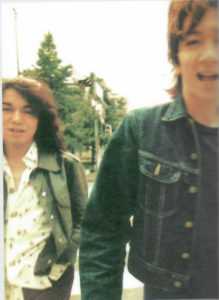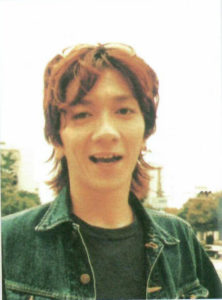
(From Talkin’ Rock , January 1996)
I went to your concert at the Osaka Kouseinenkin Hall the other day. (09/01/1995).
(Yoshii) Right. We met backstage if I recall correctly.
That’s right. I also saw your previous concert there too (03/21/1995).
(Yoshii) Right.
Actually, the last concert of yours I saw before that was one at Namba W’ohol way back on 09/05/1993.
(Yoshii) Huh!? (Laughs) Well then, I assume your impressions of the more recent concerts were quite a bit different?
Absolutely. I’m not sure whether I’d describe it as you having broken through, or having gotten more refined! (Laughs)
(Emma) I’ll go with more refined! (Laughs)
(Yoshii) Then what was everything up until now?! (Laughs) But I know what you mean.
(Emma) In between when we played Namba W’ohol and Osaka Kouseinenkin Hall, there was also the Kokusai Koryu Center (03/24/1994) and Sankei Hall (12/23/1994) shows.
That’s true. Unfortunately I didn’t get to see the tour for Jaguar Hard Pain.
(Yoshii) So what you’re saying is that you warped right to the most difficult time for the band! (Laughs)
Huh? That was a difficult time for you?
(Yoshii) Yeah, I can talk about it now. You could say that were lost in a lot of ways. Though that’s passed, and now we can have these fun concerts where we more or less do what we want.
(Emma) And honestly, the number of people who come to them have gone up.
It’s true that in terms of capacity, it goes up by about three times going from Namba Wo’hol to Osaka Kouseinenkin Hall.
(Yoshii) And the quality of people who come to them has changed a bit too.
I really felt that too. Is that because the number of fans of the band suddenly shot up with “Smile”?
(Yoshii) I think so.
(Emma) Well, in a way it was also an album created to achieve that.
Right, right. If I’m being honest, I always listen to your albums regardless of interviews, and I’ve gotten more and more into them since “Smile” (Laughs)
(Yoshii) Ahh, I see. In other words, you’ve come here and fallen right into our trap! (Laughs) And now we’re taking you away to our ant lion larva’s pit! (Laughs) (This is a reference to a lyric from Jaguar Hard Pain’s “Sekirara Go! Go! Go!”)
“Our ant lion’s larva pit”? (Laughs)
(Yoshii) Anyway, it’s true that “Smile” was something of a crossroads for us. The feeling of the group has been changing since that album, and it’s an album with a very important position in the history of the band.
And would you say that your current album “Four Seasons” reinforced that change even more strongly?
(Yoshii) Yes, absolutely.
And then after releasing “Smile” in February 1995, you went immediately on a countrywide tour, then back to recording, and then “Four Seasons” was done! All in the course of a mere 9 months!
(Emma) Yeah, I guess we have a lot of energy in us these days. We feel like we shouldn’t stop the flow of things.
(Yoshii) And the recording went so smoothly.
(Emma) That’s true.
“Four Seasons” in particular has such a straightforward sound that it’s surprising. As if it’s saying “THIS is Japanese rock!”.
(Yoshii) It has a good feeling to it, right? We wanted to just get a really sharp rock sound for that album.
(Emma) It’s very relaxing, in a good way. There were a lot of guitar parts that I just played according to the mood.
It’s straightforward and simple sounding, but also very dynamic.
(Yoshii) Right. We went to England to record for the first time, and that had quite a lot of influence on the album’s sound. If we’d recorded it in Japan, I think we would have done a lot of dubbing and mixing on the recording. And as a result of not doing that, each individual sound is a lot thicker. It’s a lot more powerful this way.
(Emma) When we do a bunch of unnecessary stuff in mixing, we always end up fighting about it anyway.
(Yoshii) That’s true. That’s why it ended up being OK with all of us as long as we had sharp sounding drums and guitars. And we agreed we didn’t need too much fancy keyboard or whaling horns. If we did things the same way we had up until then, we would have wanted to put in a cello and been like “Guys…no one in this band plays cello!” (Laughs)
Meddling in your own affairs! (Laughs)
(Yoshii) But it really does feel that way, like we have much more of a bare bones sound…When we don’t use any more elaborate arrangements or stranger lyrics than are necessary, things are much more relaxed in a way, and I think that’s how this album ended up like it did. It was a mystery to me too that it came out the way it did.
Why did you make those kinds of changes? Your previous albums were conceptual and had a very intense quality to them. Much like a control pitcher, or something. Just when you made us think you were going to throw a standard straight pitch with “Smile”, you throw a straight fastball with the next album. The lyrics, melodies and arrangements don’t feel like they have any of the previous elaborate elements put into them, it’s like you did a complete 180.
(Yoshii) Yeah. I guess I’d say…up until around the third album there were aspects of us that were heading toward being very niche rock. I think of that as The Yellow Monkey’s first era.
(Emma) We were still getting our feet under us.
(Yoshii) Right. We could have just gone ahead and continued in that niche direction, but…that would have been boring! (Laughs)
Right! (Laughs)

(Yoshii) We wanted to get bigger. That’s why we wanted to get signed, after all. We first realized that we managed to arrive there while still being niche was when we played the Budokan back in April. And I guess that was the one at which we started feeling that the niche part of us had ended, and it was time to move forward. And now we’re in The Yellow Monkey’s second era: We’ve broken away from being niche, and we have to perform more toward a larger fanbase in order to get bigger and grab ahold of the world.
I see. The lyrics do still have some unique twists to them, but…
(Yoshii) The lyrics on this album have phrases that were forbidden in our lyrics before this, like “blue sky”! (Laughs) The phrase “The sun is burning” (taiyou ga moeteiru) came out, and it was like “What’s going on?!” (Laughs)
Right! (Laughs) “Taiyou ga Moeteiru” was the name of the single after all!
(Yoshii) Right! The old me never would have been able to imagine me saying that I like the sun! (Laughs)
How were you able to start writing in so much more straightforward of a way?
(Yoshii) I think I was just putting on airs before. I was embarrassed by the things that came out of me naturally. A lot of bands are still like that too, even now.
(Emma) There was a bit of putting on airs, but there were things I liked about it too. It was sort of an era where we’d get drunk off of putting on airs.
Ahh, was it sort of like you being cocky?
(Emma) Yeah, exactly.
(Yoshii) There may have been some ways in which we had fun with that. But the reason we moved away from that was…probably lack of confidence. But we have a lot of confidence in how we are now, both live and recorded. I think there were areas in which we were lacking previously, and we were constantly going through processes of trial and error. I was always embarrassed to just be myself on stage. But Japanese rock will never change if we keep on doing things that way! (Laughs) We wrote “Four Seasons” vaguely thinking about taking on the world.
(Emma) We’re not putting on any airs at all now. You could say we’re doing what we want now! (Laughs)
(Yoshii) Right. That’s why I do an octopus dance on stage now (Laughs) It’s like…where did that version of myself that was embarrassed about everything go?! (Laughs)
You’re really getting into this! (Laughs)
(Yoshii) Yeah (Laughs) But I honestly feel like we can do anything as we are now. We could even make nursery rhymes sound cool. And “Four Seasons” is a really good album! But it’s important to remember that this album only exists because of the ones that came before it. We aren’t a band that only ever plays straight rock stuff, it’s very important to us that we’ve come this far by inspiring such enthusiasm from fans as a more niche rock band. There may be some fans who think we’re boring since we’ve been changing quite a bit, but all we can about that is apologize! (Laughs) These sorts of things are inevitable.
(Emma) And I’m very interested to hear what people who have become fans of the band from listening to “Four Seasons” think when they go back and listen to our older albums.
Right. Because of course you still play some of your older songs during concerts now. For me personally, I felt like the songs from the first through third albums had a slightly more unapproachable quality to them.
(Yoshii) Yeah, I think there are a lot of people who feel that way! (Laughs)
But something I thought when I was watching the concert back in September was that the older songs fit into the set with no problems! (Laughs) After the concert was over I realized “Oh yeah, they did play some old songs too!”.
(Yoshii) We definitely know that well, so maybe we feel the same way? They’re more than just songs, they also represent our moods. We’re full of confidence right now, so I really believe that The Yellow Monkey has the power right now to make anything that we do sound cool.
(Emma) Yeah, because we’re playing whatever we want live. So we really can’t do anything but have fun.
By the time this issue comes out, the Osaka-Jo Hall (12/17/1995) and two days at the Budokan (12/28/1995 and 12/29/1995) will have already come and gone.
(Yoshii) I’m really looking forward to the Osaka show! We really want to start aggressively pursuing more live performances. I want to have concerts that will even make the venue security guards turn around in surprise! (Laughs) Previously…was it in Hokkaido? One of the security guards in the front row was dancing around with his fist in the air! (Laughs) We looked each other right in the eyes (Laughs) Anyway, we want to have more really fun and energetic concerts.